
The AC Locomotive Group is a dedicated AC electric locomotive preservation society in England. It has five locomotives in its care: 81002, 82008, 83012, 85101 and 89001.

The AC Locomotive Group is a dedicated AC electric locomotive preservation society in England. It has five locomotives in its care: 81002, 82008, 83012, 85101 and 89001.
In 1996, Pete Waterman, who had purchased the sole surviving examples of AC electric classes 81, 82, 83 and 85, put his entire fleet of locomotives for sale. The AC Locomotive Group (ACLG) was formed with the intention of purchasing all four machines. This was accomplished in June 1997, and three of the four locomotives were moved to Barrow Hill Engine Shed in December 1998, with the fourth joining them in early 2000. Also between 2000 and 2008, the group had 84001 on loan from the National Railway Museum, and this was given a major cosmetic overhaul following a long period stored in the open.
In 2002, leasing company HSBC Rail UK placed 86213 on loan to the group while in 2004, 86401 was purchased. [1] The same year, GNER placed 89001 into the group's care following closure of part of Doncaster Works where it had been stored out of use.
In 2005 the ACLG was honoured by the naming of 87002 as The AC Locomotive Group. [2] This was owned by Porterbrook and painted in its purple colour scheme, and later became the last Class 87 to haul a passenger train in regular service. Also in 2005, the group purchased 86101 and 86213. [3]
At the end of 2006 GNER put 89001 up for sale, and following a high-profile appeal, the ACLG successfully purchased the loco for preservation. [4] In 2008, the group was able to acquire the loco that carried its name, 87002, for preservation. [5] For four months in early 2008, 86101 operated services from London King's Cross to Doncaster hauling Cargo-D Mark 3s under hire to First Hull Trains. [6] In February 2016, 86213 was sold for export to Bulgaria. [7]
The ACLG hired 86101, 86401 and 87002 to main-line operator Electric Traction Limited for use on Caledonian Sleeper services from London Euston to Edinburgh and Glasgow between 2015 and 2019. [8] After this work ceased in May 2019, 86101 and 87002 were sold to Locomotive Services and 86401 to West Coast Railways. [9] [10] [11]
The ACLG made great strides to restore electrical equipment in their early locomotives; early successes included the restoration of auxiliary equipment (including cooling fans) in locomotives 82008 and 83012. In 2006, 81002 was completed electrically to a condition where it could be powered up from the overhead wires.
Most locomotives in the collection have received full cosmetic overhauls since acquisition, with both 82008 and 85101 receiving fictitious makeovers for various periods. As at June 2020, 89001 is in the final stages of an overhaul to return it to main line operation. [12]
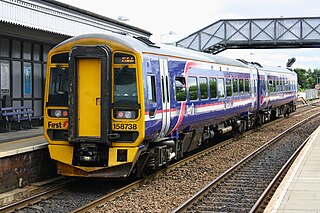
First ScotRail was a train operating company in Scotland owned by FirstGroup. It operated the ScotRail franchise between October 2004 and March 2015.

Great North Eastern Railway, often referred to as GNER, was a train operating company in the United Kingdom, owned by Sea Containers, that operated the InterCity East Coast franchise on the East Coast Main Line between London, Yorkshire, North East England and Scotland from April 1996 until December 2007.

DB Cargo UK, is a British rail freight company headquartered in Doncaster, England.

The British Rail Class 89 is a prototype electric locomotive. Only one was built, in 1986, by British Rail Engineering Limited's Crewe Works. It was used on test-trains on both the West Coast and East Coast Main Lines. The locomotive was fitted with advanced power control systems and developed more than 6,000 bhp. After being withdrawn in 1992, it was returned to service in 1996, before being again withdrawn in 2000. As of January 2021, it is in the final stages of an overhaul that will return it to the main line.

A Driving Brake Standard Open (DBSO) is a type of railway carriage in Great Britain, converted to operate as a control car; this is not to be confused with DVTs, such as those in InterCity 225 sets. Fourteen such vehicles, numbered 9701 to 9714, were converted from Mark 2F Brake Standard Open carriages. Modifications included adding a driving cab and TDM equipment to allow a locomotive to be driven remotely. Using a system known as push–pull, the driver in the DBSO can drive the locomotive, even though it is at the opposite end of the train.
Porterbrook is a British rolling stock company (ROSCO), created as part of the privatisation of British Rail. Together with Angel Trains and Eversholt Rail Group, it is one of the three original ROSCOs.
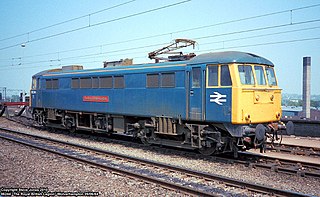
The British Rail Class 86 is a class of electric locomotives built during the 1960s. Developed as a 'standard' electric locomotive from earlier prototype models, one hundred of these locomotives were built from 1965 to 1966 to haul trains on the then newly electrified West Coast Main Line (WCML) from London Euston to Birmingham, Crewe, Liverpool, Manchester and later Glasgow and Preston. Introduction of the class enabled the replacement of many steam locomotives, which were finally withdrawn by British Rail in 1968.

The British Rail Class 73 is a British electro-diesel locomotive. The type is unusual in that it can operate from the Southern Region's 650/750 V DC third-rail or an on-board diesel engine to allow it to operate on non-electrified routes. This makes it very versatile, although the diesel engine produces less power than is available from the third-rail supply so the locomotives are rarely operated outside of the former Southern Region of British Rail. It is one of the first bi-mode locomotives ever built. Following the withdrawal and scrapping of the more powerful Class 74 bi-mode locomotives in 1977, the Class 73 was unique on the British railway network until the introduction of the Class 88 bi-mode locomotives in 2017. Ten locomotives have been scrapped.

The British Rail Mark 3 is a type of passenger carriage developed in response to growing competition from airlines and the car in the 1970s. A variant of the Mark 3 became the rolling stock for the High Speed Train (HST).
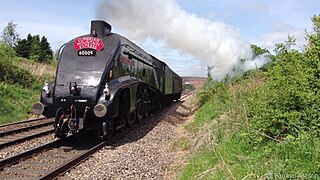
60009 Union of South Africa is a LNER Class A4 steam locomotive built at Doncaster Works on 16 April 1937. It is one of six surviving A4s. Its mainline certification expired in April 2020. As the locomotive is subject to a boiler inspection, it was moved to the East Lancashire Railway as the original plan was to keep it running there until the end of boiler certificate and then send it somewhere else for static display, but a cracked boiler tube forced it into retirement prematurely. It was briefly renamed Osprey during part of the 1980s and 1990s due to political opposition against apartheid in South Africa at the time.
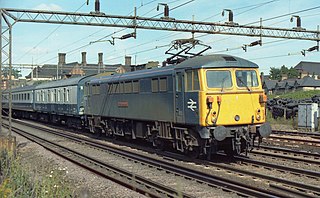
The British Rail Class 87 is a type of electric locomotive designed and built by British Rail Engineering Limited (BREL) between 1973 and 1975. A total of thirty-six locomotives were constructed, to work passenger and freight services over the West Coast Main Line (WCML).

The British Rail Class 37 is a diesel-electric locomotive. Also known as the English Electric Type 3, the class was ordered as part of the British Rail modernisation plan. They were numbered in two series, D6600–D6608 and D6700–D6999.

The British Rail Class 90 is a type of electric locomotive. They were built for mixed-traffic duties, operating from 25 kV AC overhead lines and producing 5,000 bhp (3,700 kW). They weigh 84.5 tonnes and can typically achieve a top speed of 110 mph (177 km/h).
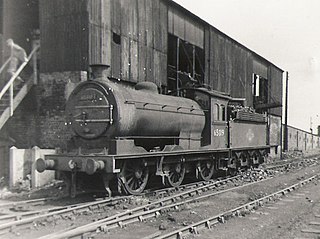
The North Eastern Railway (NER) Class P3, classified J27 by the LNER, is a class of 0-6-0 steam locomotive. The P3 Class was designed by Wilson Worsdell and was a relatively minor modification of the existing North Eastern Railway Class P2. The most significant change was a deeper firebox with shallower sloping fire grate. This was achieved by raising the boiler slightly, and by reducing the clearance between the firebox and the rear axle. The P3 Class were a freight engine by nature and used for hauling long trains of freight.

Caledonian Sleeper is the collective name for overnight sleeper train services between London and Scotland, in the United Kingdom. It is one of only two currently operating sleeper services on the railway in the United Kingdom, the other being the Night Riviera which runs between London and Penzance.

GB Railfreight (GBRf) is a rail freight company in the United Kingdom. As of 2022, it is owned by the global investment company Infracapital.

Electric Traction Limited was a British electric locomotive hire company. It operated some former British Rail Class 86 and 87 electric locomotives hired from associated company Europhoenix and the AC Locomotive Group from 2010 until 2019.

Cargo-D was a spot hire railway carriage company in England. It commenced operations in June 2007, ceasing in October 2011.

Europhoenix is a spot-hire railway locomotive company in England. In addition to the hiring out of locomotives to various other operators across the United Kingdom, it commonly exports former British Rail rolling stock to operators in mainland Europe.

Locomotive Services Limited is a train operating company in Great Britain. The company operates rail tours using heritage steam, diesel and electric locomotives with support from associated companies and trusts.